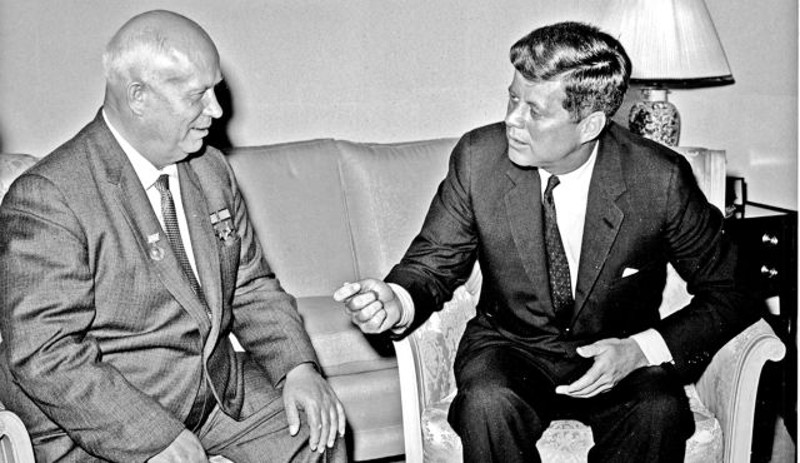 In 1960. At least that’s what Khrushchev thought.
In 1960. At least that’s what Khrushchev thought.
Khrushchev took a particularly keen interest in the 1960 US presidential election. Having engaged Nixon in the famous 1959 “Kitchen Debate” while on tour in the US, he became convinced that the firm anti-Communist would be impossible to do business with. He determined to help elect whoever the Democratic nominee was.
First, he tried to convince Adlai Stevenson to run again. Stevenson declined to openly seek a third straight nomination, mostly out of pride and a desire to be asked rather than have to ask. But he was certainly not about to be goaded into it by the Soviets.
Then, when John F. Kennedy became the nominee, Khrushchev tried to intervene in the election on his side. Quoting from Dan Carlin’s podcast on the Cuban Missile Crisis:
In the book Inside the Kremlin’s Cold War by Vladislav Zubok and Constantine Pleshakov, it’s interesting to read exactly how much Khrushchev was hoping Kennedy would become the president. But not because he thought he was weak, but because he thought he might be another Franklin Roosevelt, someone who could reach out and have another relationship the way Stalin’s and Roosevelt’s relationship was seen to be.
Khrushchev apparently did everything he could to help Kennedy get elected. He told KGB officers in Washington to analyze the situation, and if there was anything they could do diplomatically or with propaganda to help, to do it. He called Kennedy, ‘his president’ after he was elected, and told Kennedy at the first eye-to-eye meeting they every had, ‘I got you elected.’
Zubok and Pleshakov go on (p. 238) to detail that they were rebuffed when they rather clumsily tried to approach Robert F. Kennedy directly. However,
In the end, Khrushchev did influence the U.S. presidential elections by his belligerent rhetoric, as well as by demonstrating that a constructive U.S. – Soviet dialogue would be impossible so long as Eisenhower or Nixon remained in the White House. Twenty years before the revolutionary leadership of the Islamic Republic of Iran used American hostages to influence a U.S. presidential campaign, Khrushchev did the same by holding captive two pilots of the U.S. reconnaissance plane RB-47, shot down in July 1960 over the Soviet North. Along with fears of the “missile gap,” Kennedy successfully exploited the issue of the captive pilots in his barbs against the Eisenhower-Nixon administration.
Correctly or incorrectly, Khrushchev believed this was a decisive factor in the elections. From his memoirs, Khrushchev Remembers, page 458, he details how he mentioned this to Kennedy at the Vienna summit:
By this time President Kennedy was in the White House. Not long before the events in Berlin came to a head, I met Kennedy in Vienna. He impressed me as a better statesman than Eisenhower. Kennedy had a precisely formulated opinion on every subject. I joked with him that we had cast the deciding ballot in his election to the Presidency over that son-of-a-bitch Richard Nixon. When he asked me what I meant, I explained that by waiting to release the U-2 pilot Gary Powers until after the American election, we kept Nixon from being able to claim that he could deal with the Russians; out ploy made a difference of at least half a million votes, which gave Kennedy the edge he needed.
Of course, at the time, nobody accused RFK or JFK of actually colluding with the Soviets to ensure JFK’s election. (That would have to wait for another election, and another Kennedy.)



